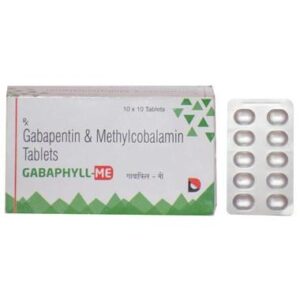METHYLCOBALAMIN + GABAPENTIN
Methylcobalamin: Methylcobalamin is a form of vitamin B12 that is commonly used as a dietary supplement and medication. It is an active and bioavailable form of vitamin B12, which is essential for the functioning of the brain, nerves, and blood cells.
This drug is primarily used to treat vitamin B12 deficiency, a condition that can be caused by various factors such as inadequate dietary intake, malabsorption issues, or certain medical conditions. Vitamin B12 deficiency can lead to symptoms such as fatigue, weakness, tingling or numbness in the hands and feet, difficulty walking, memory problems, and anemia.
The mechanism of action of methylcobalamin involves its conversion into coenzyme B12, which is required for various enzymatic reactions involved in DNA synthesis, amino acid metabolism, and the production of myelin, a protective covering of nerve fibers. By supplying the body with adequate vitamin B12, methylcobalamin helps maintain the health and proper functioning of the nervous system.
The recommended dose of methylcobalamin for most adults is 1,000 mcg to 2,500 mcg per day, either orally or through injections. The exact dosage may vary depending on the severity of the vitamin B12 deficiency and other individual factors. This drug is typically taken once daily, but your healthcare provider will determine the appropriate dosage based on your specific needs.
Common side effects of methylcobalamin are generally mild and include diarrhea, itching, or mild rash. In rare cases, allergic reactions such as swelling of the face, tongue, or throat, and difficulty breathing may occur, which requires immediate medical attention. Although rare, high doses of methylcobalamin may lead to hypokalemia (low potassium levels) or symptoms such as palpitations, muscle cramps, or weakness.
It is important to note that methylcobalamin may interact with certain medications, such as medications for diabetes and certain antibiotics. Therefore, it is essential to inform your healthcare provider about any other medications you are taking to avoid potential drug interactions.
Overall, methylcobalamin plays a crucial role in the treatment of vitamin B12 deficiency and maintaining the health of the nervous system. By following the recommended dosage provided by your healthcare provider, you can minimize the risk of side effects and maximize the benefits of this essential vitamin.
Gabapentin: Gabapentin is a medication that is primarily used to treat seizures and nerve pain, such as that caused by shingles or diabetic neuropathy. It belongs to a class of drugs called anticonvulsants.
The exact mechanism of action of gabapentin is not fully understood. It is believed to work by affecting the chemicals in the brain that are involved in transmitting pain signals. It may also increase the activity of the neurotransmitter GABA (gamma-aminobutyric acid), which has a calming effect on the nervous system.
The dose of gabapentin varies depending on the condition being treated. For epilepsy, the starting dose is usually 300 mg taken orally three times a day. This can be increased gradually to a maximum dose of 3600 mg daily. For nerve pain, the starting dose is typically 300 mg taken orally once a day, and this can be increased to a maximum dose of 1800 mg daily.
As with any medication, gabapentin can cause side effects. Common side effects include dizziness, drowsiness, headache, blurred vision, and coordination problems. These side effects are usually mild and go away on their own. Less common but more serious side effects may include allergic reactions, difficulty breathing, swelling of the face or extremities, and mood changes.
It is important to note that gabapentin can also cause dependence and withdrawal symptoms if abruptly stopped. Therefore, it is usually tapered off gradually under the guidance of a healthcare professional.
Overall, gabapentin is an effective medication for controlling seizures and relieving nerve pain. However, it is important to discuss with your doctor about the potential benefits and risks of using gabapentin, as well as any other medications you may be taking.


